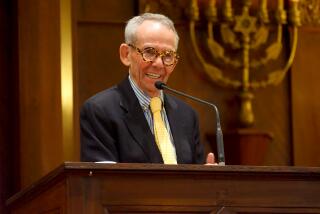The limits of language
- Share via
Can there be a political writer who has not fallen in love with George Orwell’s 1946 essay, “Politics and the English Language”? Part of its appeal is what’s appealing about all of Orwell -- its directness and honesty, its plain-spokenness, its faith, against all evidence, that human affairs can be conducted morally, its sense of being on the side of ordinary people, not of the sophisticated and powerful. The only people Orwell attacks by name in “Politics and the English Language” are two celebrated academics, Harold Laski and Lancelot Hogben, not the kind of minor-grade politicians and bureaucrats who would have made easy targets.
“Politics and the English Language” begins as a lesson, and quite a good one, in how to write well (delivered in the form of an attack on people who write badly) and ends with the hope that better writing can engender a better society. What idea could be more attractive to writers than that what we do, if improved along the lines Orwell suggests, can improve not just our readers’ experience of our work but the lives of everybody?
The primary villain in “Politics and the English Language” is the kind of fancy, pretentious, imprecise prose usually purveyed by intellectuals (Orwell’s particular targets were intellectuals on the left), not the state. Nobody who has read the essay can ever use a formulation such as “not unlike” again with a clear conscience. Orwell issues a blanket condemnation of all use of abstractions in political discussion -- such words as “democracy,” “justice,” “science,” “class” and “equality.”
There is nothing wrong with Orwell’s advice in “Politics and the English Language”: Simple is better than complicated; concrete is better than abstract; careful is better than sloppy; think before you write. The experience of the last few years would lead me to add that in political language, function is far preferable to emotion. The words used to denote something the government does should have to do with the activity itself, not the values it is meant to embody or the feelings it is meant to activate. The war in Iraq, yes; Operation Enduring Freedom, no.
Bad writing is, unfortunately, eternal; surely there is even more of it today, by weight, than there was in 1946. Still, whether Orwell’s idea -- that better writing and clearer language can actually improve politics -- applies today is a tough question. There are real limits to how what’s wrong with politics can be fixed linguistically.
To my mind, an even more frightening political prospect than the corruption of language is the corruption of information. Language, especially in the age of the Internet, is accessible to everybody. Some users of language are more powerful than others, or more honest, or more adept -- but the various ways of speaking about politics can at least compete in the public square.
Information, on the other hand, is much less generally accessible than words. When the process of determining the facts of a situation has been intentionally corrupted by people in power (whether, let’s say, Saddam Hussein had the ability to produce nuclear weapons, or whether a new drug has harmful side effects), there often is no corrective mechanism at hand. Intellectual honesty about the gathering and use of facts and data is a riskier and more precious part of a free society than is intellectual honesty in language. We ought to guard it with the same zeal that animates Orwell’s work on political speech.
Nicholas Lemann is dean of the Columbia University School of Journalism and a staff writer for the New Yorker.
More to Read
A cure for the common opinion
Get thought-provoking perspectives with our weekly newsletter.
You may occasionally receive promotional content from the Los Angeles Times.









